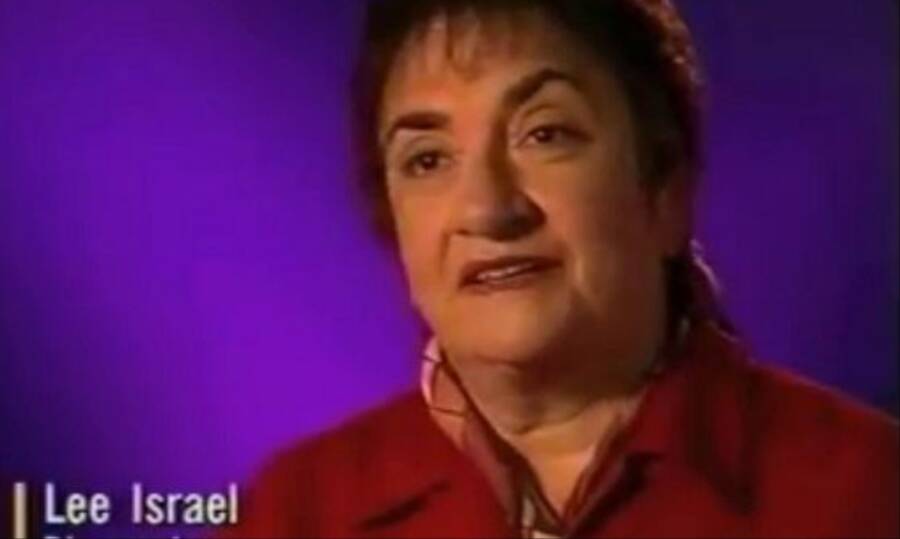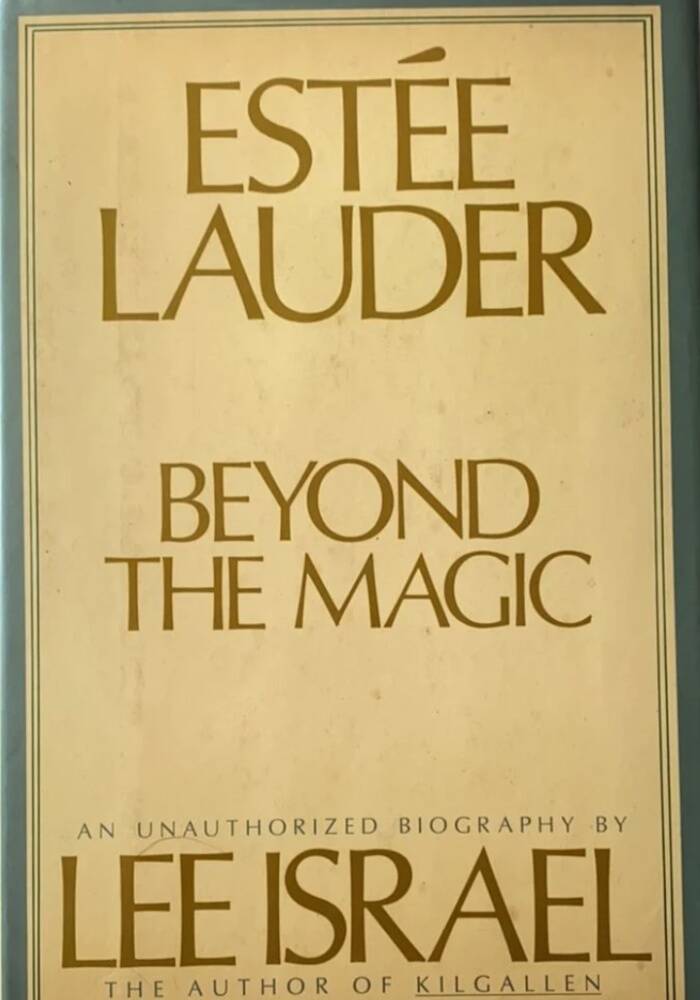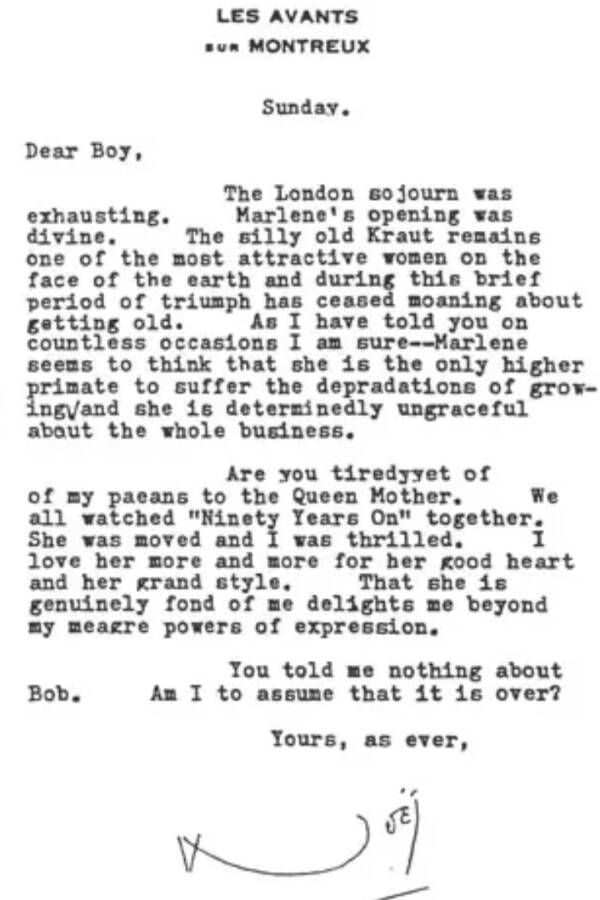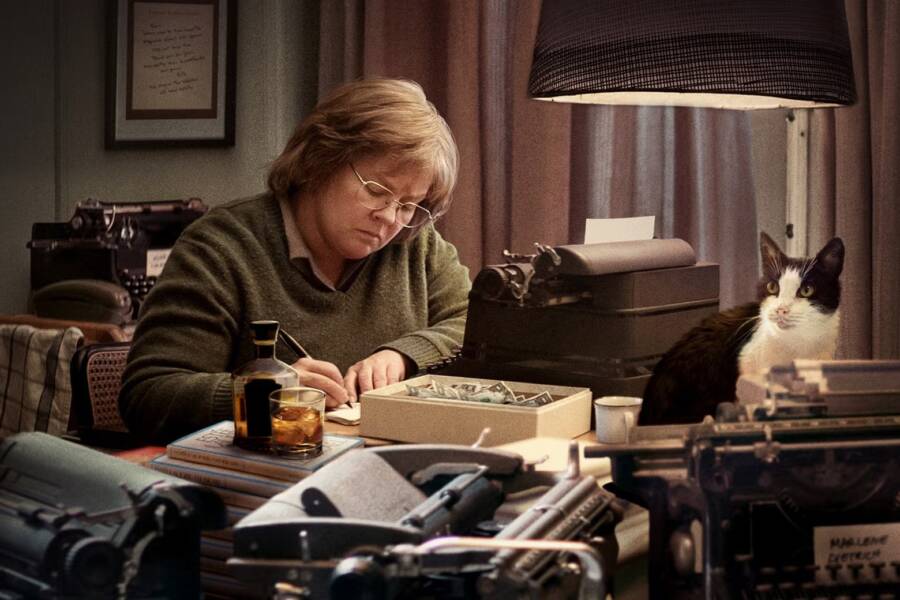Starting in the early 1990s, down-on-her-luck writer Lee Israel began to expertly forge letters from famous figures like Noel Coward and Ernest Hemingway — and then sell them to collectors.

AlchetronLee Israel in an undated interview.
In 2018, Melissa McCarthy starred in Can You Ever Forgive Me?, a dramatic caper about a down-on-her-luck writer who turned to literary forgery to get by. But while the film is fiction, it’s based on a real-life figure, Lee Israel, who successfully forged the letters of celebrities for years.
Israel was a successful writer for decades. But in the 1980s, her career entered a downward spiral after she published a poorly-received biography of Estée Lauder. As she struggled to get by, Israel turned to a life of crime. She started producing fake letters from celebrities like Dorothy Parker, Noel Coward, and Ernest Hemingway, and selling them to collectors.
Over less than two years, Israel forged hundreds of such letters — some of which even made their way into official collections. She also stole letters, replaced them with her duplicates, and sold the originals for profit. But though she was eventually caught and punished for her crimes, Israel once remarked that her forged letters were her “best work.”
This is the true story of Lee Israel, the literary forger behind Can You Ever Forgive Me?
How Lee Israel’s Career Entered Its ‘Downward Tumble’
Leonore Carol Israel was born in New York City on Dec. 3, 1939. She attended Midwood High School in Brooklyn and graduated with a bachelor’s degree in speech from Brooklyn College in 1961, before starting her career as a writer.
Throughout the 1960s and 1970s, Lee Israel made a decent living writing for publications like the New York Times and Soap Opera Digest. She eventually transitioned into writing biographies.
Her first biography Miss Tallulah Bankhead, on actress Tallulah Bankhead, came out in 1972. Her next biography, Kilgallen, on journalist and television personality Dorothy Kilgallen debuted in 1979 — and even landed on the New York Times bestseller list for a week.
Lee Israel’s star was rising. However, Israel’s third biography, 1985’s Estée Lauder: Beyond the Magic, was panned by critics. Not only did some find it “incoherent” but it was also dwarfed by Lauder’s own memoir, which the makeup mogul had published to preempt Israel’s book.

Macmillan Publishing CompanyLee Israel’s biography of Estée Lauder flopped, and sent her writing career into a downward spiral.
This proved to be the turning point in Lee Israel’s life. In her memoir Can You Ever Forgive Me? Memoirs of a Literary Forger, Israel explained that it was the first time she had ever faced a devastating professional setback.
“I had never known anything but ‘up’ in my career,” she wrote.
Before long, Lee Israel found herself unable to find work — and with her bills increasing. So, she decided to use her talents as a writer for a different purpose: literary forgery.
From A Legitimate Biographer To A Forger And A Thief
According to an interview Lee Israel gave to NPR in 2008, her transition from a legitimate biographer to a literary forger “happened incrementally, like most evil things do.”
In 1991, Israel found herself facing down multiple expenses, including vet bills for her cat. So, she visited the New York Public Library for the Performing Arts and stole three letters written by the comedian Fanny Brice.
“I went to the library and was given a bunch of letters, which I should not have been given in a nonsecure area,” she told NPR. “[I] took a couple of Fanny Brice letters, slipped them in my sneakers, and sold them to a place called Argosy on the east side of New York City.”
Israel was able to sell the letters for $40, and noted that “for the first time in a long time, I had some jingle in my jeans.”
Having made a tidy sum from the Brice letters, Israel then came up with a way to make even more money — by “improving” and “elevating” letters by famous figures like Noel Coward, Ernest Hemingway, and Dorothy Parker, and selling them to collectors. In other words, creating fakes.

Can You Ever Forgive Me? A letter supposedly from Noel Coward, which was actually faked by Lee Israel.
She used her research skills as a biographer, and studied the subjects of her forgeries. After her research was complete, Lee Israel typed made-up messages on pieces of blank vintage papers she swiped from the back of library books. She typed them with a variety of period typewriters that she purchased from resale stores.
To finish the job, Israel forged the celebrity’s signature. She practiced the signatures over and over until they were nearly perfect.
Carefully to not attract attention, Israel sold the letters for modest amounts, usually around $50 or $100. Within a year and a half, Israel had created over 400 forged letters “written” by a variety of figures.
“My success as a forger was somehow in sync with my erstwhile success as a biographer,” Lee Israel later wrote in Can You Ever Forgive Me? Memoirs of a Literary Forger. “I had for decades practiced a kind of merged identity with my subjects; to say I ‘channeled’ is only a slight exaggeration… You own the character. I finally owned Noel Coward and Edna Farber and Louise Brooks and people like that. I had always adored large personalities, I had a good ear and I guess a talent to amuse. I could be funny, and that’s how I did it.”
But after a while, some in the literary community began to grow suspicious about the authenticity of the letters Israel as selling. To avoid detection, she pivoted again. Instead of selling her forgeries, she stole letters from libraries or archives — replacing them with a duplicate — and sold the originals.
This plot worked — for a while. But when someone learned that a letter he’d purchased from Israel actually belonged to Columbia University, the gig was up. The customer alerted the FBI, and, in 1993, Israel plead guilty to one count of conspiracy to transport stolen property. She was sentenced to six months of house arrest and five years of probation.
But even the FBI was impressed by Israel’s work.
“She was brilliant,” former FBI agent Carl Burrell told The New York Times. “My favorite [letter] was Hemingway. He was complaining about Spencer Tracy being cast as the main character in ‘The Old Man and the Sea.’ ”
Lee Israel’s Story Becomes The Oscar-Nominated Film ‘Can You Ever Forgive Me?’
In 2008, Lee Israel caused new waves in the literary community when she released her own memoir. In the book, Israel detailed her forgeries and thefts and how she sold her forgeries to memorabilia and autograph dealers.
The book was met with some criticism from people who were outraged that Israel was once again profiting from her crimes. Nonetheless, the memoir became the basis for the 2018 film Can You Ever Forgive Me?, starring Melissa McCarthy as Lee Israel.
The co-writer of the 2018 film, Nicole Holofcener, told the Guardian that she emailed back and forth with Israel while writing the script. While Israel had a reputation for being brash, the scriptwriter told the outlet that Israel gave some good notes and feedback. However, Israel expressed little shame for what she had done.
Holofcener described Israel as being, “immensely entitled, even all these years later. Naturally she was flattered that a film was being made of her life but she wasn’t remotely surprised. She felt it was entirely her due.”

20th Century FoxMelissa McCarthy as Lee Israel in Can You Ever Forgive Me?
Both McCarthy and her co-star, Richard E. Grant, were nominated for Best Actress and Best Supporting Actor at the Oscars, and the film was also nominated for the Academy Award for Best Adapted Screenplay
McCarthy remarked there is something to learn from Israel’s story:
“[I]t’s such a great story for people to see,” McCarthy told USA Today. “It’s a pretty good thing to have a reminder [that] you never know what someone’s going through. Pass them on the street, they seem like just another number – someone very unnoticeable and forgettable – and yet you never know.”
And until the end, Lee Israel remained proud of her story
“My work has received some attention and marvelous reviews,” Israel, who died in 2014, told NPR, “and people have liked the letters. And so they’re salable, apparently.”
After reading about Lee Israel, the infamous literary forger whose story became a movie, learn about the dramatic life of Ted Hughes, the husband of poet Sylvia Plath. Or, look through this collection of F. Scott Fitzgerald quotes on writing, love, and delusion.





